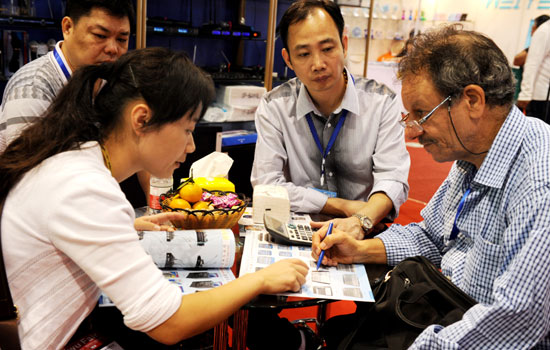
The continuing appreciation of the renminbi is pressing small and medium-sized enterprises, which are already suffering from a lack of overseas orders and rapidly rising costs.
|
 |
|
An exhibitor and buyer at the 18th China Yiwu International Commodities Fair in Yiwu, Zhejiang province, on Sunday. [Photo/China Daily] |
Jiang Kexing, manager of Zhejiang Hongxu Trading Co Ltd in Yiwu, Zhejiang province, said the biggest problem at the moment is the sharp decrease in the number of orders and making nearly zero profit.
"We have to squeeze to minimize the costs of everything including labor, materials and even catering for the workers as well to make really low profits to keep the company operating," said Jiang.
He said the appreciation of the renminbi will definitely increase his company's struggle to survive with limited profits in the slowing economic environment. His company received about one-third of the orders it had last year and expects to have negative profit growth until the end of the year.
With the recession in Europe getting worse, most exporters in China are having severe difficulties in making a profit.
According to the Wenzhou Shoe and Leather Industry Association, more than 800 of the 2,761 shoe manufacturers in the city closed or ceased production in the past nine months.
"Most of those companies got in trouble from the lack orders and almost zero profit resulting from the appreciation of the renminbi," said Xie Rongfang, secretary-general of the Wenzhou Shoe and Leather Industry Association.
Xie said the renminbi appreciation's squeeze on the profit margin of Wenzhou SMEs came on top of the steadily growing costs labor and materials.
Experts have suggested that the slump in overseas orders was actually caused by the appreciation of the renminbi.
"The sharp decrease in demand from abroad was mainly caused by the appreciation of the renminbi, which cost China its advantage of having the lowest labor and materials costs in the global trading market," said Rui Meng, a professor of finance and accounting at China Europe International Business School in Shanghai.
Rui said it is better for SMEs to take short-term orders to control the risk of being affected by fluctuating exchange rates and to add conditions to contracts that prices can be adjusted depending on fluctuations in exchange rates.
Over the long-term, SMEs should improve the quality of their products through more innovative techniques and stand out from the competition with uniquely branded products, Rui said.
"Replacing workers through automation or moving certain production lines overseas to save on labor costs is also a good option as a long-term plan for medium-sized enterprises," Rui said.
In fact, some SMEs are tackling quality and labor cost issues by shifting to mechanized manufacturing.
"Some of the SMEs in the association have bought machinery from Italy to replace hundreds of workers with 10 to 20 university graduates, saving on labor costs and manufacturing high-end products of a higher quality and price," said Xie from the Shoe and Leather Industry Association.
However, the appreciation of the renminbi had little influence on large and medium-sized enterprises that have regular clients and long-term orders.
"We've already got a reputation with regular clients who rely on our products as being a permanent supplier, and that won't be affected by the slight appreciation of the renminbi from the long-term perspective," said Zheng Zhe, general manager of Zhejiang Gulifa Group, a medium-sized tool-making enterprise in Wenzhou.
Zheng said that if renminbi appreciation continues, the company will probably have to make some pricing adjustments.
yuran@chinadaily.com.cn
 Market flat, Japan-brand sales plummet
Market flat, Japan-brand sales plummet China initiates new exporter review for Nissan
China initiates new exporter review for Nissan Toyota not to close China factories
Toyota not to close China factories Audi: Local models, not price cuts, hold the key
Audi: Local models, not price cuts, hold the key